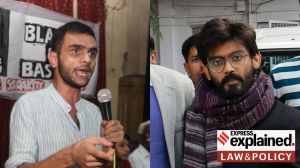Florida fears in FInal days
Counting down to an Election Day expected to draw record-shattering turnout, voting-rights watchdogs are sounding the alarm that a repeat of the Florida fiasco of 2000 could occur in any of a dozen battleground states.

Counting down to an Election Day expected to draw record-shattering turnout, voting-rights watchdogs are sounding the alarm that a repeat of the Florida fiasco of 2000 could occur in any of a dozen battleground states. Lawsuits are already flying in many of these states.
Voting-rights advocates in Colorado, to take just one example, told a federal judge on Wednesday that nearly 30,000 voters were recently purged in violation of federal voting rights law and should be restored in time for Election Day.
Across the battleground states, where Democrats had a 2-to-1 advantage in new registrations, voting-rights groups contend the 11th-hour verifications demanded by Republican officials are partisan attempts to disenfranchise the new voters.
The flood of millions of first-time voters across the country could lead to crowded and contentious polling places, triggering last-minute identity checks that could deny ballots to those whose names or addresses don8217;t match other government records.
8220;This one is the meltdown scenario,8221; Judith Browne-Dianis, co-director of the Advancement Project founded by civil rights lawyers to pursue racial justice. Common Cause, the American Bar Association, the League of Women Voters and a phalanx of other public interest groups are urging states to ensure that the polls are adequately staffed to handle an unprecedented onslaught 8212; as high as 85 per cent of registered voters. Turnout in 2004 was 60.7 per cent, the biggest share since the 1960s.
Although that would be a welcome boost to participatory democracy, voting advocates are worried about its effect in states like Virginia, which has one of the lowest ratios of voting machines to registered voters. 8220;Voters will simply walk away, if the lines are too long,8221; warned Susannah Goodman, who directs the election reform program at Common Cause.
Litigation brought in recent weeks in Ohio, Georgia, Florida and Colorado may alert voters about the potential they8217;ll be challenged. But in many states, the verification methods have created more obstacles than they have removed. In Florida, an aggressive 8220;no match, no vote8221; standard has been applied to question whether over 10,000 of those who have signed up since the start of the year should be given ballots despite discrepancies between their registration information and their government records, said Tova Wang, vice president for research at Common Cause.
- 01
- 02
- 03
- 04
- 05































